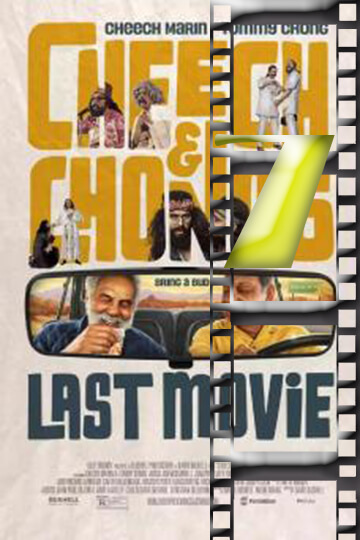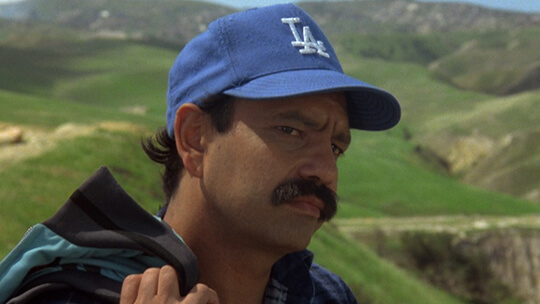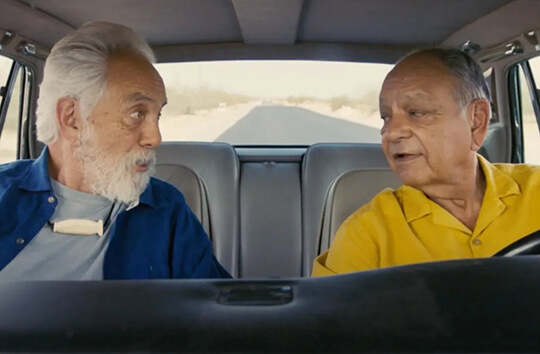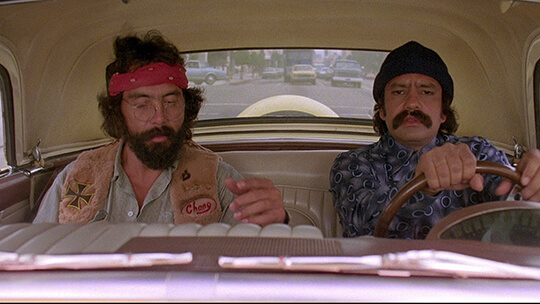



WHAT’S IT ABOUT
Cheech Marin and Tommy Chong discuss their lifelong friendship and popularity as a comedic duo. Features interviews, sketches and never-before-seen footage spanning their five-decade career.



MOVIESinMO REVIEW
Let’s be honest for a moment – I never imagined in a million years that I’d spend two hours watching two stoner older men driving around the desert, but here we are. “Cheech & Chong’s Last Movie” branched out into places I didn’t expect, and as a Black critic, I connected with some parts of their story that are all too often dismissed. Director David Bushell compiles this half-road-movie, half-lesson-in-history documentary. We witness 78-year-old Cheech Marin and 86-year-old Tommy Chong cruising down desert highways, recalling the past while taking on passengers along the journey, like their longtime producer, Lou Adler, and Tommy’s wife, Shelby. It’s a bit too much like a set-up sometimes and a bit too much like real life, but that mix does work. The film alternates between these car interviews and sit-down interviews in which both men tell separately. They will sometimes remember the same incident totally differently, which is sort of interesting. They still hold grudges from years and years back, and watching them work their way past that tension gives the documentary’s most powerful moments. This is what jumped out at me: both of these men went through some really terrible racism when they were young. Tommy Chong, a half-Chinese guy in 1940s Canada, was treated like garbage by his culture. His mom instructed him at an early age that different meant twice as much work. That’s something all Black children learn to memorize. Cheech grew up in South Central LA and doesn’t mince words about what that was like. “I saw three murders right in front of my eyes before I was 7,” he reports. That’s the real talk. His family might have had middle-class finances, but the streets did encroach upon his existence. When he relocated to Granada Hills, he got to feel what integrated communities were really about – something that shaped the way he’d then collaborate with Tommy. The documentary suggests how both men found means of escape through creativity. Tommy discovered Black culture and fell in love with it. He says, “When I fell upon black culture, my life was gorgeous.” He wasn’t even talking about the music – he was talking about finding a community of people who embraced him when his own would not. The wild thing is the way their album came together. These were not two guys getting stoned and cracking jokes. They labored. The film shows them grinding through small clubs, perfecting their timing, and figuring out how to make their stoner personas work on different platforms – from live shows to albums to movies. Their first movie, “Up in Smoke,” made $104 million on a $2 million budget. That’s a success by any measure. But. That’s where the business aspect gets sloppy – they only got 10% of the profits while their producer Lou Adler got 90%. That’s something all artists need to learn: read your contracts and know your value. The documentary doesn’t pull anything back on their problems. Instead of just wanting to do things the way they wanted, they just wanted to have total creative control over their next films, while Cheech felt like he wasn’t getting anything for his ideas. His manager, Howard Brown, appears to be like every dirty business player who ever took advantage of artists. The final straw was when Tommy wouldn’t appear to make a cameo in Cheech’s “Born in East LA” video because he felt the role was beneath him. That’s when I finally realized the real dynamic. Cheech was the writer, the politician brain, the one in the know about the business side. Tommy was the artist, the director, the man who brought the visual comedy about. When those roles started to compete with each other instead of complementing one another, it all dissolved. Tommy comes forward about his multi-pronged love life – dating two women simultaneously and having children with both. His first wife, Maxine, says she “loved him” but wouldn’t necessarily call herself “cool” with what was occurring. That openness is welcome in a celebrity culture that normally keeps the sordid secrets of stars’ personal lives under wraps. Cheech is not as loose-mouthed about his marriages, referring to them in a short and almost nonexistent part of the documentary. But you can see how different their two personalities are – Tommy is the open book, while Cheech keeps his cards closer to his chest. The highlights come when they’re just reminiscing along in the car, with no script, working through their issues. These moments are genuine and account for why their chemistry lasted for so long. Even during their arguments, you know there’s love beneath. The bottom line is when the documentary becomes too nostalgic and amounts to a clip show. The archival material plods when they’re merely showcasing their poorer later films. The animated segments appear cheap and unnecessary. What works about this documentary is the way that it captures something real about American entertainment. They weren’t two potheads making dumb jokes – they were two misfits who discovered each other and created something that spoke for an entire generation of people. Their interracial work together was radical in the 1970s, and it’s still rare today. They were the counterculture, but they wanted to make money off of it. That conflict between remaining loyal to your heritage and selling out is one that all artists must endure. The documentary broaches the subject but doesn’t probe far enough. “Cheech & Chong’s Last Movie” succeeds because it presents two men who have lived rich lives, who have sinned and continue to stumble towards each other. It’s not merely a stoner comedy – it’s about friendship, imagination, race, and the cost of success. It could have been more condensed at 90 minutes instead of two hours, and it does get stuck on nostalgia instead of delving into the deeper themes. But watching these two old friends struggle through decades’ worth of hurt feelings that still resolve into plainly affectionate good feelings about each other? That’s time worth. For a documentary on two guys who ride high and make people laugh, it’s surprisingly based on real human emotion. That’s what makes it good.
OUR RATING – A BLUNT 7

